The health benefits of Vitamin K2 are seemingly endless—bone support, muscle support, immune builder, energy promoter, and Alzheimer’s fighter to name a few.
But Vitamin K2’s ability to improve cardiovascular health is perhaps its greatest benefit. After all, heart disease remains the top killer in the world, so any nutrient that attenuates the risk has the potential of saving millions of lives.
The research validating the cardiovascular benefit is substantial.
For example:
Researchers involved in the European Prospective Investigation into Cancer and Nutrition tracked 33,000 people for almost 17 years and found increased intakes of Vitamin K2 reduced the risk of mortality from coronary heart disease.
Another research project, the Prevention of Renal and Vascular End-Stage Disease Study, followed 8,592 subjects and linked Vitamin K deficiency with high blood pressure, cardiovascular disease, and other chronic diseases.
Meanwhile, a 2024 study conducted at the University of Copenhagen examined the synergistic benefit of supplementing vitamins K2 and D together and found there was a compounded benefit in reducing coronary artery calcification.
Now a new study, focusing specifically on middle-aged women, has found supplementing Vitamin K2 “improves blood pressure and vascular stiffness” of postmenopausal women.
Types of Vitamin K
“Vitamin K” is actually a class of vitamins. This class includes Vitamin K1 (also called phylloquinone), as well as Vitamin K2 (menaquinone). They work differently in the human body and come from different food sources.
Vitamin K1 comes from plant sources such as leafy greens and blueberries. Vitamin K2 is more common in animal products, fermented foods and some kinds of cheese.
Vitamin K
The Covid fighter
During the Covid pandemic a study conducted in the Netherlands found Vitamin K2 status had a stronger association with Covid-19 related inflammation than Vitamin D deficiency.
The main take-away from the study, say researchers, is that Vitamin D supplementation should be complemented with Vitamin K2 to make the regimen more effective.
The study was conducted by researchers at Canisius-Wilhelmina Hospital, and was published in Frontiers in Nutrition in January 2022.
Read more >>>
Vitamin K2 remains in the body longer than Vitamin K1 and provides substantial health benefits that have only come to light during the past two decades.
Vitamin K2 can be further divided into different forms. For example, Vitamin K2-MK7 (also known as vitamin K2-7, or menaquinone-7) is widely regarded as being the most efficient and effective form of Vitamin K2.
New study
The new study is actually a “post-hoc analysis” of an earlier 2020 clinical study evaluating the cardiovascular benefits of Vitamin K2 (menaquinone-7).
The original study examined vascular stiffness and blood pressure in participants as they supplemented with Vitamin K2 for a one-year period.
All the participants had low Vitamin K status at baseline.
For the new gender-specific analysis researchers divided 165 women into two groups: 78 pre-menopausal and 87 post-menopausal. As with the original study, all the women had low Vitamin K status at baseline.
The researchers found that after one year, the Vitamin K2 supplementation had “improved vascular flexibility by significantly attenuating vascular stiffness in post-menopausal women.”
The study was published in Nutrients in February 2025.
Because there were large baseline differences in vascular stiffness between participants, both groups had been further divided according to a low or high stiffness index.
The post-hoc analysis then revealed that the post-menopausal women with a high stiffness index at baseline showed significant improvements in multiple vascular markers after supplementation—in addition to lower blood pressure in the brachial and carotid arteries.
The opposite was true in the placebo group. The lack of supplementing is this group showed pre- and post-menopausal women with a high stiffness index “exhibited significantly increased brachialis and carotid artery blood pressure, with a stark differential.”
Promising results for women
Estrogen begins to decline for most women in their late 30s, and Vitamin K2 has been studied previously as a possible mitigating nutrient. This includes a 2015 long-term clinical trial found that three years of daily Vitamin K2 supplementation was linked to significant improvements in multiple measures of vascular health in 244 women.
The researchers, who noted their study was based on the earlier 2015 study, summarized that the two studies together provide evidence of the benefits of Vitamin K2 intervention as women age:
“The main findings underscore that menopause negatively affects vascular health, yet Vitamin K2 as MK-7 supplementation can mitigate these effects. Additionally, this analysis strongly suggests that supplementation… has potential as a targeted intervention to improve cardiovascular health in post-menopausal women.”
Optimal Health Systems offers several formulas that provide Vitamin K2:
Optimal Longevi-D
(with K2, CoQ10 and Vitamin D)
Optimal 2 Vitamin/Mineral
(with K2 and all other essential vitamins and minerals)
Essential DAK1K2
(with both K1 and K2, and other fat-soluble vitamins)
– – –
Source: Nutrients.


